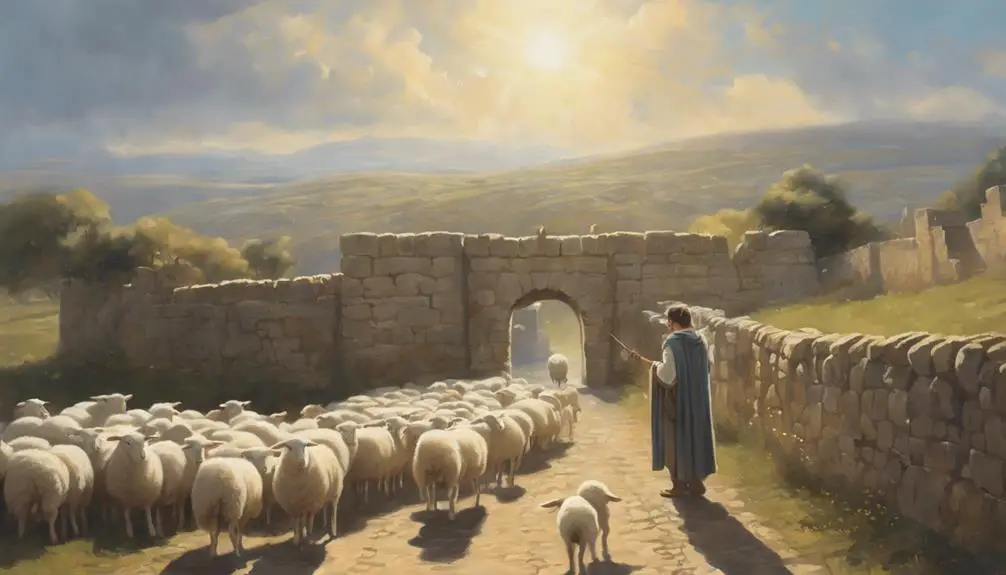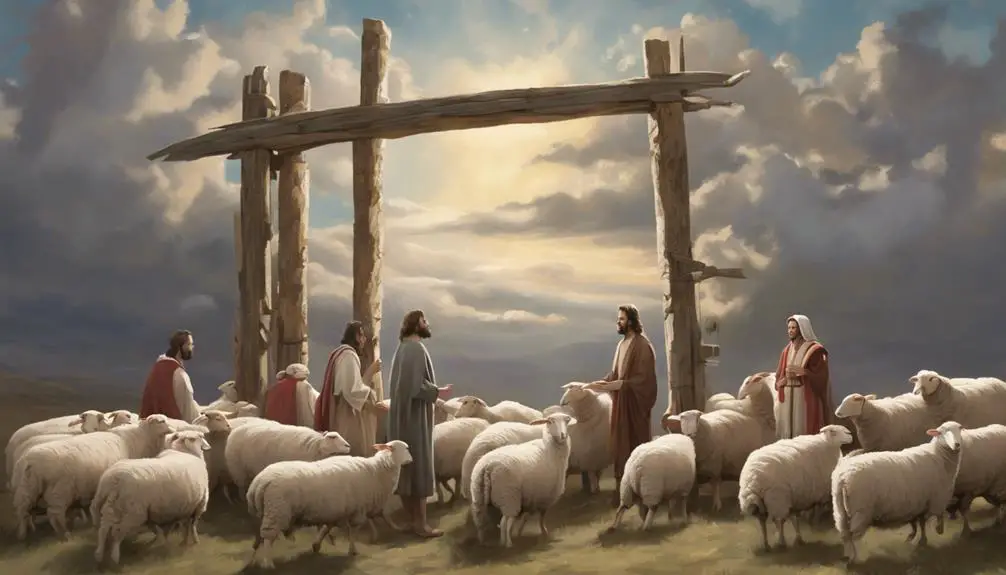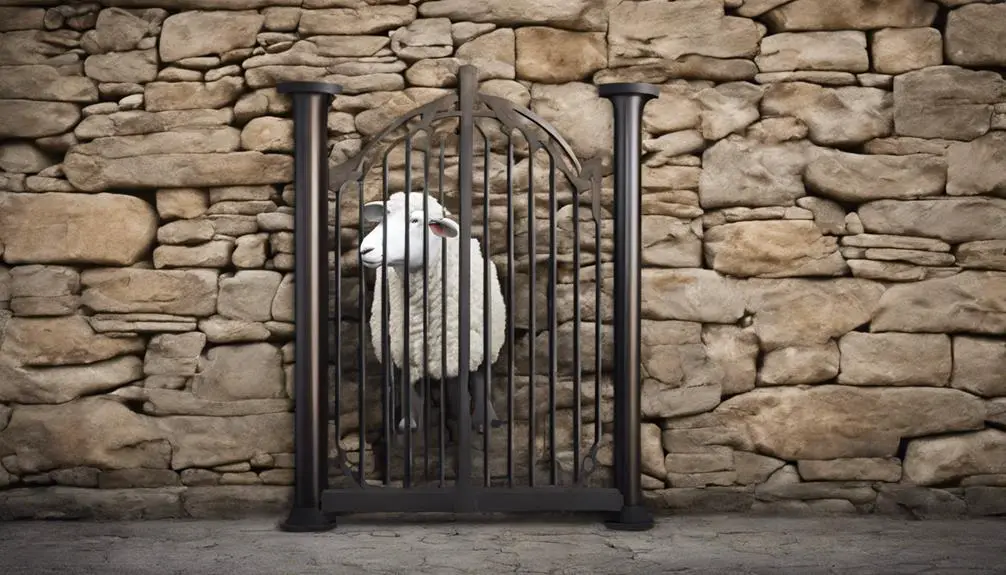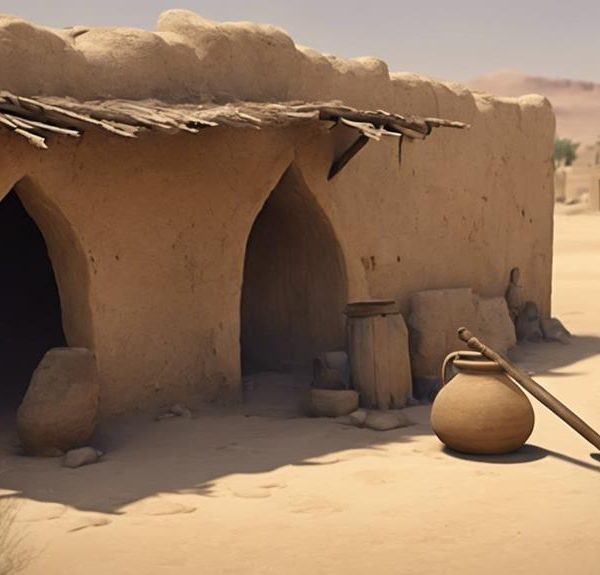Fathom the spiritual symbolism of the Sheep Gate in the Bible and its surprising connection to Jesus Christ's teachings.

What Is a Sheep Gate in the Bible
Imagine you're time traveling back to the era of the Old Testament, when city walls and gates were as common as smartphones today. One of these ancient gates, the Sheep Gate, holds significant importance in the Bible. It's mentioned in the Book of Nehemiah as the first gate to be rebuilt after the Babylonian exile.
The Sheep Gate's symbolism, however, extends beyond mere architectural significance. You'll find its spiritual implications fascinating, especially its ties to Jesus Christ's teachings.
So, why is this gate so special, and what might its relevance be for us today?
Key Takeaways
- The Sheep Gate in the Bible was a pivotal entry point for livestock in ancient Jerusalem, integral to the city's economy and religious practices.
- Biblically, the Sheep Gate symbolizes a transformative passage, representing the journey of sheep for temple sacrifices.
- In Jesus Christ's teachings, the Sheep Gate represents the path to salvation, with Jesus likening himself to a 'good shepherd'.
- Modern interpretations of the Sheep Gate highlight themes of faith renewal, spiritual transformation, and the importance of selflessness in one's faith journey.
Historical Context of the Sheep Gate

While you may know it as a biblical term, the Sheep Gate holds significant historical importance, serving as a crucial point of entry and exit for the livestock that were essential to the economy and religious practices of ancient Jerusalem. This gate was no simple structure. Its construction was a careful process, incorporating robust materials and architectural techniques that have allowed remnants to survive until the present day.
You can imagine traders guiding their flocks through this gate, the bleating of sheep echoing off the stone walls. Sheep trading wasn't just an economic activity; it was an integral part of society. The livestock provided meat, milk, and wool, while also serving as vital offerings in religious rituals.
The Sheep Gate's location was strategic. It's positioned near the Temple Mount, enabling a direct route for the animals to be taken for sacrifice. Its proximity to the Bethesda Pool also ensured a ready source of water for the livestock. So, you see, the Sheep Gate wasn't just a gateway; it was a lifeline, a bustling hub of trade and religious activity. Its construction and the role it played in sheep trading were vital to the functioning of ancient Jerusalem.
Sheep Gate's Biblical References

Building on its historical significance, let's now explore how the Sheep Gate is referenced and portrayed in biblical texts. Its construction is often associated with the Shepherd's role, symbolizing spiritual guidance and protection.
The Sheep Gate is primarily mentioned in Nehemiah and John. In Nehemiah, the gate's construction is highlighted, emphasizing its role in Jerusalem's fortification. In John, the gate is where sheep destined for temple sacrifices were herded, underscoring the shepherd's role.
To analyze these references, let's examine them:
Book |
Reference to the Sheep Gate |
|---|---|
Nehemiah 3:1 |
"Eliashib the high priest and his fellow priests went to work and rebuilt the Sheep Gate." |
Nehemiah 12:39 |
"Over the Gate of Ephraim, Jeshanah Gate, Fish Gate, Tower of Hananel, and Tower of the Hundred, to the Sheep Gate." |
John 5:2 |
"Now there is in Jerusalem near the Sheep Gate a pool, which in Aramaic is called Bethesda." |
John 10:1 |
"Very truly I tell you, anyone who does not enter the sheep pen by the gate, is a thief and a robber." |
In these texts, you can see the Sheep Gate's significant role in biblical narratives, having both a practical and symbolic purpose.
Understanding the Symbolism

Delving into the symbolism behind the Sheep Gate can offer profound insights into its biblical significance. The Sheep Gate, as you may already know, is a notable feature in the ancient city of Jerusalem. But let's move beyond the historical and geographical aspects and delve into the rich symbolism it carries.
The Gate Symbolism in the Bible often signifies a transition or passage. It's a point of entry or exit, a threshold between two realms or states of being. In the case of the Sheep Gate, it's the passage where sheep, destined for sacrificial rituals, were led through. This denotes a transformation, from a mundane existence to a sacred purpose.
Shepherd Metaphors in biblical texts are also prevalent and deeply meaningful. Sheep are often seen as symbols of the faithful, while the shepherd represents God or his appointed leaders. The shepherd's role, guiding the sheep through the gate, underscores the divine guidance offered to the faithful.
In essence, the Sheep Gate is a powerful symbol of guidance, transformation, and sacrifice. It embodies the journey of faith, highlighting the path from the earthly to the divine, guided by divine leadership.
Role in Jesus Christ's Teachings

Turning to the teachings of Jesus Christ, you'll find that the Sheep Gate plays an integral role, particularly in illustrating His divine mission and the spiritual transformation He offers. Christ's Metaphors often utilized everyday, relatable elements, and the Sheep Gate is no exception.
The Sheep Gate, where sheep destined for temple sacrifices were herded, symbolically represented the path to salvation. This is seen in Christ's metaphor of Himself as the 'good shepherd', implying his protective role over his followers. The sheep's significance lies in their representation of believers, who, like sheep, require guidance and protection.
In John 10:7, Jesus says, 'Truly, truly, I say to you, I'm the door of the sheep.' Here, He portrays Himself as the Sheep Gate, the access point to spiritual deliverance. His sacrifice, akin to the sheep's sacrifice, becomes the gateway to redemption. The metaphor underscores the transformative journey from sin to salvation, facilitated by Christ.
Understanding the role of the Sheep Gate in Jesus's teachings therefore enhances one's grasp of His mission. It's more than a physical structure; it's a profound symbol of Jesus's selfless love and the salvation He provides.
Modern Interpretations of the Sheep Gate

In today's context, the Sheep Gate holds a myriad of interpretations, each offering a unique perspective on its biblical significance. You'll find that the gate's reconstruction represents the rebuilding of faith, a renewal of commitment to God's teachings. This concept often parallels personal journeys, where you're encouraged to mend any 'broken gates' in your spiritual life.
Sheep metaphors also abound in modern interpretations. As sheep are often seen as docile and easily led, the Sheep Gate is sometimes viewed as a symbol of guidance and protection. You, like a sheep, are being guided by the divine shepherd, protected from spiritual harm. The gate serves as a barrier, keeping you within the safety of the 'sheepfold' – a metaphor for the community of believers.
In another vein, the Sheep Gate is also seen as a symbol of sacrifice. As you may know, sheep were frequently used for sacrifices in biblical times. This interpretation serves as a reminder of Christ's sacrifice, urging you to embrace selflessness in your walk of faith.
These interpretations, while diverse, all highlight the Sheep Gate's enduring relevance and profound symbolism in contemporary religious discourse.
Frequently Asked Questions
How Is the Sheep Gate Incorporated in Contemporary Religious Practices?
In contemporary religious practices, the Sheep Gate's symbolism interpretation often represents obedience and sacrifice. It's seen as a metaphor for Jesus, the 'Good Shepherd,' guiding his flock.
This religious significance is integrated through sermons, teachings, or studies, allowing believers to reflect on the spiritual lessons it imparts. It helps you understand the depth of biblical narratives and their relevance to your spiritual journey.
Are There Any Architectural Remnants of the Sheep Gate Today?
You're probably wondering if any remnants of the biblical Sheep Gate exist today. While definitive archaeological evidence is sparse, gate preservation efforts have uncovered structures that may correspond to it.
Some scholars suggest that remnants near Jerusalem's Lion's Gate could be part of the original Sheep Gate. However, without concrete evidence, it's speculative.
As you delve into this topic, remember that archaeological interpretation often involves piecing together historical clues.
How Are the Concepts of the Sheep Gate Taught in Religious Education?
In religious education, you'll find the Sheep Gate's symbolism taught alongside biblical sheep metaphors. It's used to depict a spiritual entry point, just as it was a physical one for sheep into Jerusalem.
Sheep metaphors, like the lost sheep, tie into this, representing followers seeking divine guidance. It's a deep concept, merging physical history with spiritual metaphor.
You'll explore this in-depth, gaining a nuanced understanding of biblical teachings and symbolism.
Are There Any Cultural Variations in the Interpretation of the Sheep Gate?
Yes, cultural variations in the interpretation of the sheep gate do exist. You'll find that gate symbolism often changes between cultures.
In some, it's seen as a barrier, in others, a pathway to salvation. Cultural metaphors also play a huge part in these interpretations.
Thus, the sheep gate isn't just a biblical concept, but a culturally dynamic symbol with different meanings around the world.
What Impact Does the Concept of the Sheep Gate Have on Modern Christian Theology?
In modern Christian theology, the Sheep Gate's symbolism profoundly impacts your understanding of Christ's role. It's a biblical gate metaphor representing Jesus as the shepherd, guarding and guiding His flock.
This concept reinforces the belief in Christ's protection and guidance, shaping the way you live your faith daily. It underscores the significance of trust and obedience in your spiritual journey, emphasizing the importance of following Christ, the shepherd.
Conclusion
In understanding the Bible, context is key. The Sheep Gate, with its historical context and biblical references, carries profound symbolism. Its role in Jesus' teachings further amplifies its significance.
Today, modern interpretations continue to explore its meaning. So, as you delve deeper into biblical studies, remember the Sheep Gate – a symbol of sacrifice, redemption, and divine protection, reminding us of Jesus' sacrificial love and the pathway to spiritual security.



Sign up